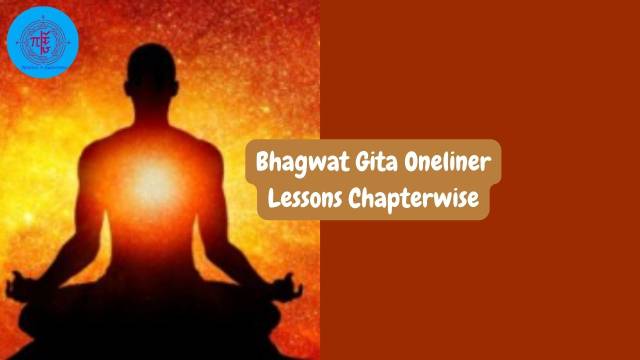
Bhagwat Gita Oneliner Lessons Chapterwise#
The Bhagavad Gita, a sacred Hindu scripture, consists of 18 chapters, each addressing different aspects of life, duty, and spirituality through the dialogue between Arjuna and Krishna on the battlefield of Kurukshetra. If you don’t have time to daily read, connect, assimilate, and practice the teachings, then these 18 lines can help you to start with. There is no shortcut in life; don’t assume this is all. This is just a starter.
Key Learnings Chapterwise#
- Chapter 1 depicts Arjuna’s confusion and grief. Seek guidance in times of confusion. The big thing is you know your thinking is muddy and fortunate thing is there is someone who can guide you btter
- Chapter 2 emphasizes knowledge of the soul’s immortality. Know that the Atma (soul) is eternal; do not grieve for the body.
- Chapter 3 (Karma Yoga) focuses on selfless action. Perform actions selflessly for spiritual progress, remaining things will be automatically taken care to the best
- Chapter 4 is about transcendental knowledge and selfless action. Dedicate every act as an offering to the Divine.
- Chapter 5 emphasizes renunciation of attachment to the result of actions. Renounce attachment from the result of actions and find bliss in the infinite.
- Chapter 6 is about meditation. Meditate daily to connect with higher consciousness.
- Chapter 7 is about understanding the Divine nature. Understand the Divine nature to experience and attain Mokha (liberation).
- Chapter 8 is about remembering God at death for liberation. Remember the Divine at death for eternal freedom.
- Chapter 9 is about divine grace and wisdom. Value the blessings of divine grace and wisdom.
- Chapter 10 is about seeing the Divine in all. “See the Divine presence in all aspects of life.
- Chapter 11 is about universal form and surrender. Surrender fully to perceive the universal truth.
- Chapter 12 is about devotion to the Divine. Focus your mind on the Divine for spiritual growth.
- Chapter 13 is about distinguishing field of knowledge and knower. Detach from illusion and find the reality.
- Chapter 14 is about the three gunas. Rise above the three modes to attain transcendence and Moksha.
- Chapter 15 is about the Supreme Person. “Prioritize the Divine in all aspects of life.
- Chapter 16 is about divine and demonic qualities. Being virtuous itself is reward. Becoming something else after being virtuous is not needed
- Chapter 17 is about the three types of faith. Be consious/awaken and choose higher Guna to have and experience true strength, otherwise your nature will push you to do something else.
- Chapter 18 is about renunciation and surrender for liberation. Surrender to the Divine for union and liberation.


Comments: